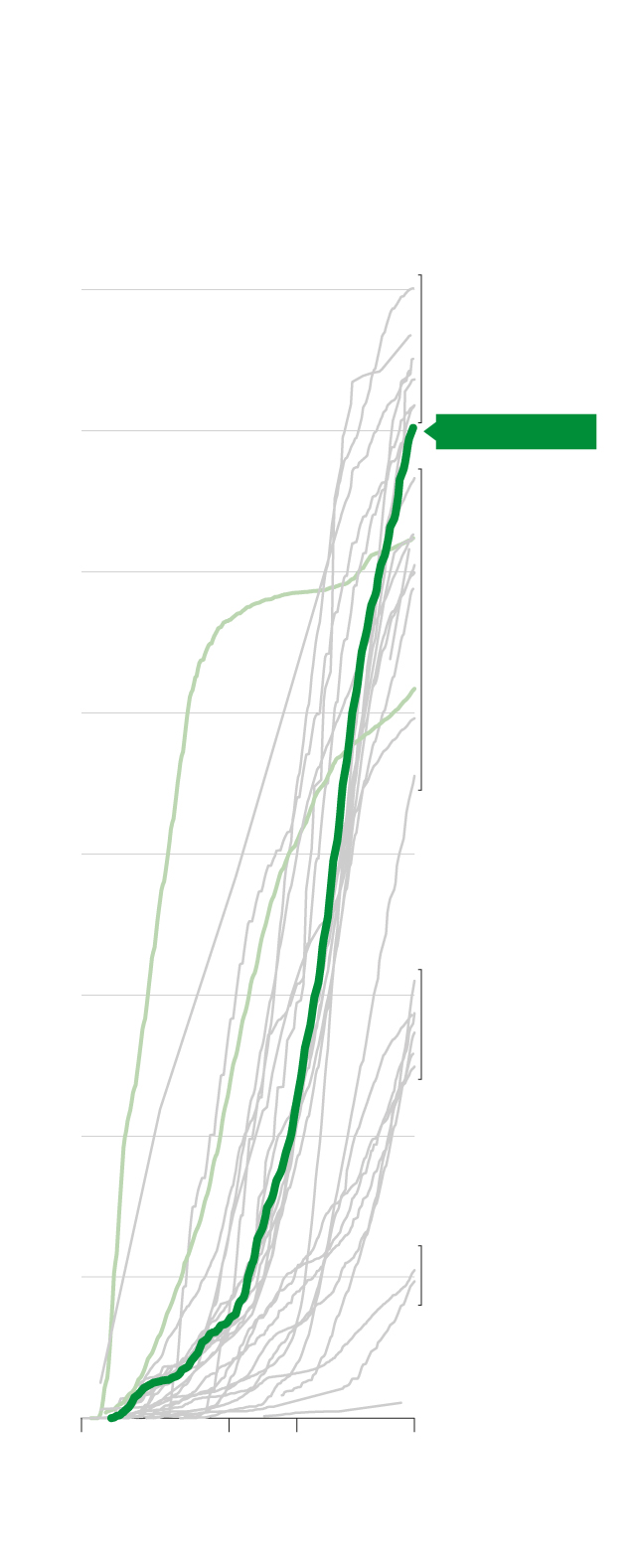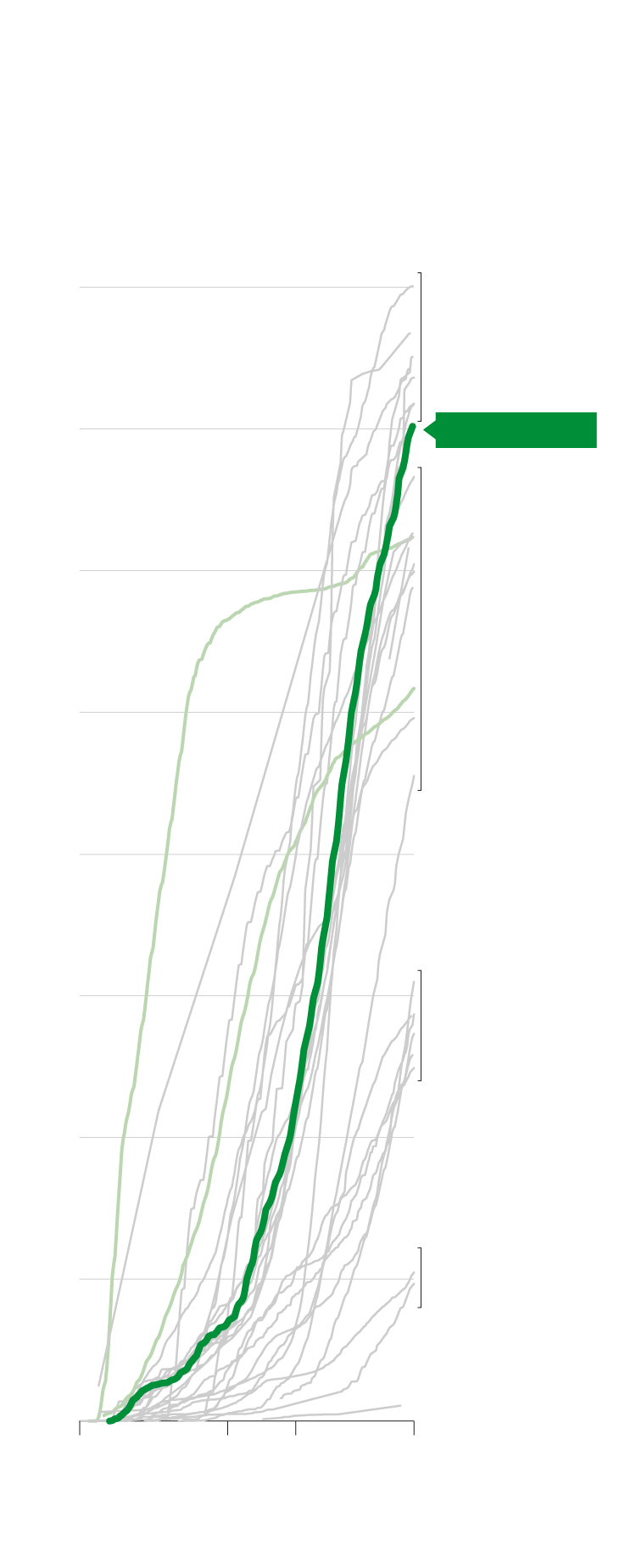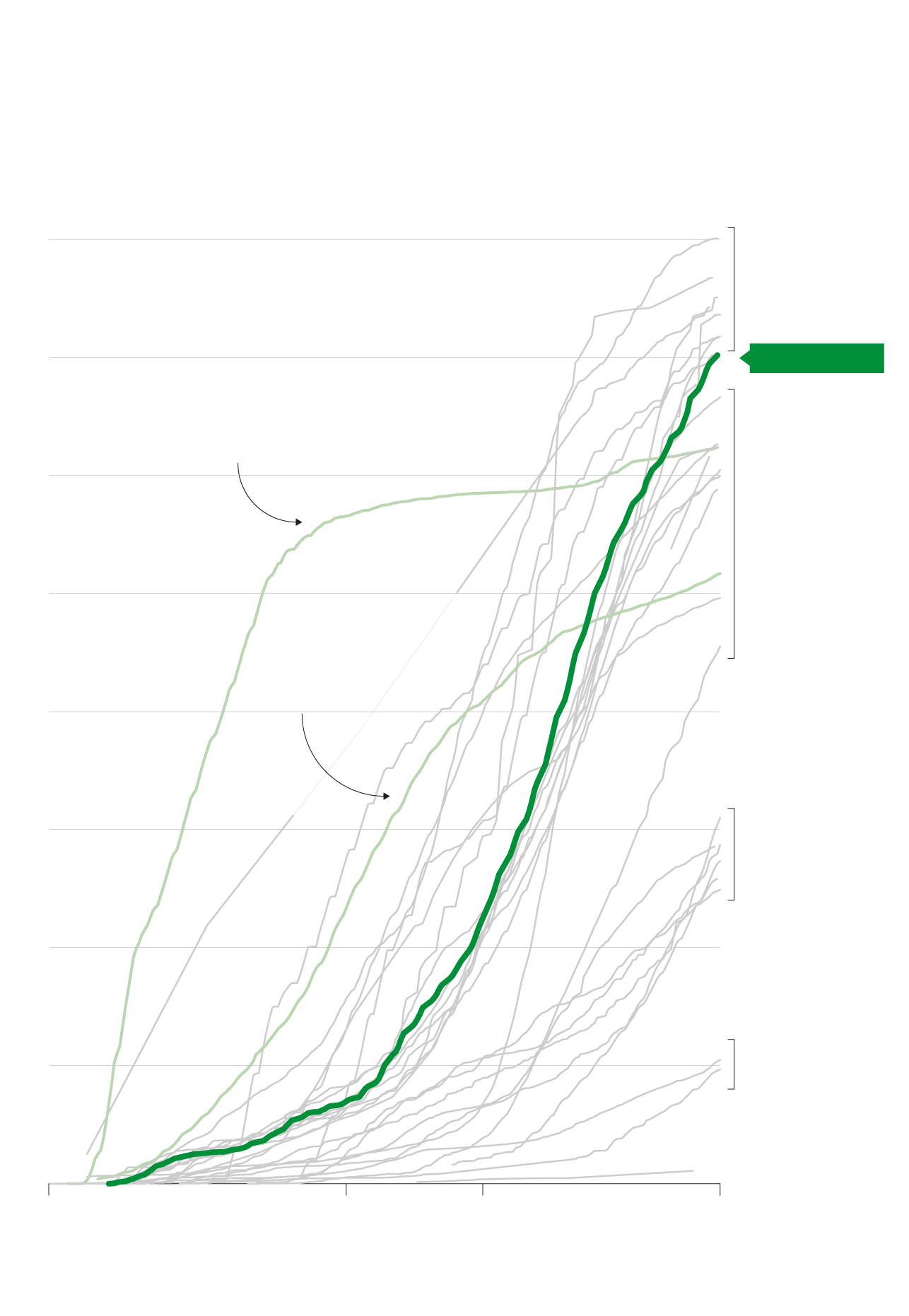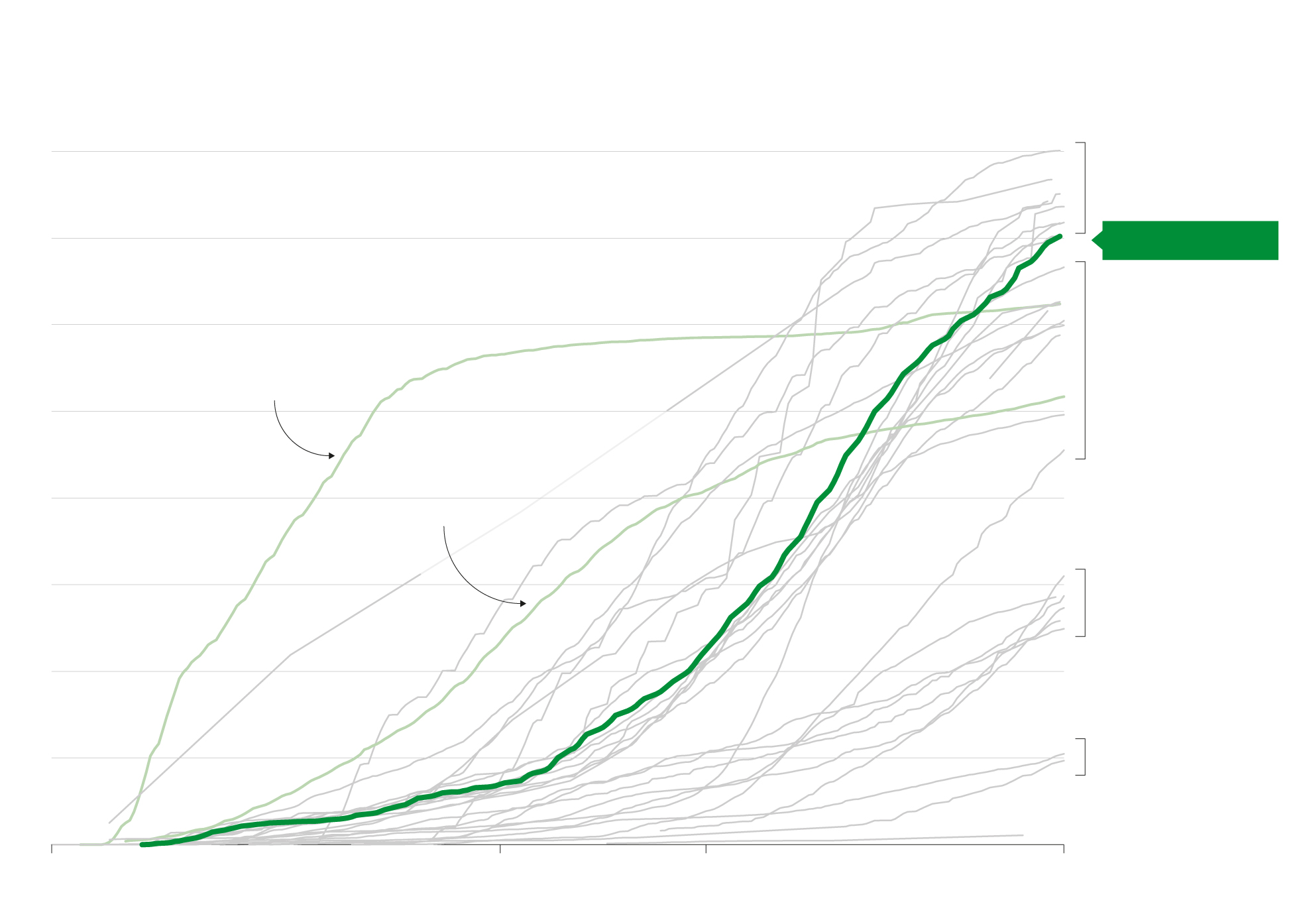In just eight months, Spain hits target of fully vaccinating 70% of population
A total of 33.2 million people are completely immunized against Covid-19, a milestone no other country of comparative size has reached in such a short period of time

Percentage of the population that is fully vaccinated against Covid-19.
Updated with latest data (from August 28 to 31)
80.1% Malta
76.8% Iceland
75.1% Singapur
74.2% UAE
73.6% Portugal
71.8% Uruguay
71.7% .
70.2% Chile
80%
70%
Spain 69.5%
66.6% Canada
62.6% United K.
62.4% Israel
62.3% Netherlands
61.6% China
60.5% Italy
59.9% Germany
58.8% France
51.7% EE UU
49.6% Poland
45.5% Japan
60%
50%
40%
40.0% Argentina
28.7% Brazil
28.6% Colombia
31.0% Australia
25.8% Mexico
24.9% Rusia
30%
20%
10.5% India
9.7% South Africa
10%
1.1% Afghanistan
0%
December 27
2020
April 15
2021
June 4
August 31
Fuente: Ourworldindata.org y Ministerio de Sanidad.

Percentage of the population that is fully vaccinated against Covid-19.
Updated with latest data (from August 28 to 31)
80.1% Malta
76.8% Iceland
75.1% Singapur
74.2% UAE
73.6% Portugal
71.8% Uruguay
71.7% .
70.2% Chile
80%
70%
Spain 69.5%
66.6% Canada
62.6% United K.
62.4% Israel
62.3% Netherlands
61.6% China
60.5% Italy
59.9% Germany
58.8% France
51.7% EE UU
49.6% Poland
45.5% Japan
60%
50%
40%
40.0% Argentina
28.7% Brazil
28.6% Colombia
31.0% Australia
25.8% Mexico
24.9% Rusia
30%
20%
10.5% India
9.7% South Africa
10%
1.1% Afghanistan
0%
December 27
2020
April 15
2021
June 4
August 31
Fuente: Ourworldindata.org y Ministerio de Sanidad.

Percentage of the population that is fully vaccinated against Covid-19.
Updated with latest data (from August 28 to 31)
80.1% Malta
76.8% Iceland
75.1% Singapur
74.2% UAE
73.6% Portugal
71.8% Uruguay
71.7% Denmark.
70.2% Chile
80%
70%
Spain 69.5%
In Israel, a pioneer of the vaccination drive, 15% of the population still does not want to get vaccinated.
66.6% Canada
62.6% United Kingdom
62.4% Israel
62.3% Netherlands
61.6% China
60.5% Italy
59.9% Germany
58.8% France
51.7% EE UU
49.6% Poland
45.5% Japan
60%
Since April, the pace of the vaccination drive in the US has slowed due to the high number of vaccine skeptics.
50%
40%
40.0% Argentina
28.7% Brazil
28.6% Colombia
31.0% Australia
25.8% Mexico
24.9% Rusia
30%
20%
10.5% India
9.7% South Africa
10%
1.1% Afghanistan
0%
December 27
2020
April 15
2021
June 4
August 31
Fuente: Ourworldindata.org y Ministerio de Sanidad.

Percentage of the population that is fully vaccinated against Covid-19.
Updated with latest data (from August 28 to 31)
80.1% Malta
76.8% Iceland
75.1% Singapur
74.2% UAE
73.6% Portugal
71.8% Uruguay
71.7% Denmark
70.2% Chile
80%
70%
Spain 69.5%
66.6% Canada
62.6% United Kingdom
62.4% Israel
62.3% Netherlands
61.6% China
60.5% Italy
59.9% Germany
58.8% France
51.7% EE UU
49.6% Poland
45.5% Japan
In Israel, a pioneer of the vaccination drive, 15% of the population still does not want to get vaccinated.
60%
50%
Since April, the pace of the vaccination drive in the US has slowed due to the high number of vaccine skeptics.
40%
40.0% Argentina
28.7% Brazil
28.6% Colombia
31.0% Australia
25.8% Mexico
24.9% Rusia
30%
20%
10.5% India
9.7% South Africa
10%
1.1% Afghanistan
0%
December 27 2020
April 15 2021
June 4
August 31
Source: Ourworldindata.org and Health Ministry.
Spain has reached the main objective that governments from all over the world had set to tackle the coronavirus pandemic: fully vaccinating 70% of its population. The country was due to have broken this barrier on Tuesday, although it will not appear in the daily report on the campaign until Wednesday, given that these data cover the previous day.
According to the available figures, Spain finished Monday with fewer than 200,000 people fully vaccinated left before it hit the target, while forecasts – based on the first doses administered in recent weeks and the speed of the campaign in the last few days – suggest that around 300,000 full doses will have been completed by Tuesday.
This is a total of 33.24 million citizens with the full protection offered by the vaccines being used in Spain: Pfizer-BioNTech, Moderna, Janssen and Oxford-AstraZeneca. It represents an unprecedented effort by the country’s central and regional health systems, and a campaign that has been among the most successful in the world. With 47.5 million inhabitants, Spain is the 27th most-populated country in the world. No other nation with a similar or greater number of residents has managed to vaccinate people against Covid-19 so quickly, according to information on Oxford University’s Our World in Data website. The only other country that has come close is Canada, with 67%. Next is the 60th most populous country, Chile, if you are to find a nation with more than 10 million inhabitants that has a similar percentage of the population with protection against Covid-19. And from there to the 83rd state on the list, Portugal, to find a country of that size with a greater percentage of residents protected (73%).
All of the other countries that have reached this milestone have much smaller populations, such as Denmark, Uruguay, Iceland and Malta. The closest countries for comparison, meanwhile, such as Italy, France and Germany, have barely managed to fully vaccinate 60% of their populations. Countries that began to vaccinate much earlier, thanks to their agreements with pharmaceutical companies – United States, United Kingdom and Israel – are moving more slowly due to the reticence of part of their populations to get vaccinated.
“Spain began with some advantages compared to neighboring countries, such as greater confidence in the healthcare system and better acceptance of the vaccines,” explains sociologist Josep Lobera, professor at Madrid’s Autonomous University (UAM) and one of the experts who, week after week, has designed and adapted the vaccination strategy from an advisory board for the Health Ministry.
The greater trust among Spaniards in the health system and vaccines has its roots in the Franco dictatorship, when polio continued to affect children while north of the Pyrenees the disease had already subsided. “That delay compared to other countries and the importance of public health is a generational reminder that lives on among our seniors,” Lobera explains.
This starting position, however, does not always guarantee good results. “This is something we have to watch out for, because we are facing very dynamic processes where a number of factors intertwine and have something of a snowball effect,” Lobera continues. “If you have doubts but your friends and family get vaccinated, in the end, you will. And vice versa. It is true that we have good coverage for [vaccination among] children, but the initial reticence to the coronavirus shots was high. We need to avoid this becoming an object of political confrontation, because that increases the reticence. We must also point to the solidarity, because by getting a vaccine you protect yourself, but also you protect the most vulnerable. That leads to some people taking the step for their seniors or for society,” Lobera adds.
The experts, however, insist that there is still work to do – there are still more than five million people in Spain who are yet to be vaccinated, and there may be a need for a third vaccine dose in order to combat the spread of the more contagious delta variant. There are no guarantees that this initial success will be repeated. The appearance of the delta strain, which was first identified in India, has meant that vaccinating 70% of the population will not be enough to achieve herd immunity. Experts are now divided between those who believe it will be impossible to reach such a situation and those who think it can be possible if vaccine coverage exceeds 85%.
Miguel Hernán, professor of epidemiology at Harvard University, believes that Spain has benefitted from two factors: “A quality healthcare system and the absence of relevant anti-vaccine movements. If you look at the curves in Israel, the United Kingdom and Israel, they are very similar in the first phase. It is true that they start to rise in different months, but that was due to the availability of vaccines in each country. This initial capacity comes from a good healthcare system, and the three countries are similar in this respect, and are able to set up an effective vaccination campaign.”
As the weeks progressed, however, the scenario began to change. “In Israel, as early as the end of February or beginning of March, the curve started to flatten due to rejection of the vaccines, mostly due to religious reasons. In the United Kingdom, [vaccine] reticence is due to other reasons, but it does exist, and the same thing happened several weeks later. In Spain, fortunately, it did not,” Hernán adds.
In recent weeks, Spain has seen pockets of the population where the vaccination campaign is barely advancing – albeit in much smaller numbers. This is particularly the case among those aged between 30 and 69 (it is not possible to detect such a phenomenon among youngsters given that the campaign is still advancing for these younger age groups). An approximation that is accepted by the experts and taking into account that no vaccine has yet been approved for the under-12s (11% of the population) indicates that vaccine hesitancy exists among between two and three million people (up to 6% of the population).
This is a very mixed group, however, and includes those who are openly anti-vaccine to those who have doubts about its safety, and others who are apathetic. “Those who openly oppose vaccines and won’t be moved are very few [in Spain], even though they are now making a lot of noise on social media,” explains sociologist Mar Griera, a researcher at the Barcelona Autonomous University (UAB). “It’s a space dominated by grays, with critical positions that don’t necessarily always lead to rejection.”
Before the coronavirus pandemic, she explains, these positions were mostly defended by middle-class people who supported alternative therapies and were critical of conventional medicine. “This is a group that uses social media, but that prefers to move in other environments. The public debate was minimal. This has changed in recent months, with the appearance of much more active profiles linked to the far right. The two groups are still separated, although they can coincide at particular moments such as when it comes to criticizing the use of masks in schools,” Griera adds, in reference to plans to continue to require face coverings for students over the age of six in Spanish education centers during the upcoming academic year.
This mistrust of the Covid-19 vaccines has greatly complicated the progress of the campaigns in other countries. In France, Germany, Italy and the United Kingdom, such suspicions have seen coverage among children plummet and have also become a public health problem that has allowed for the reappearance of illnesses such as measles.
The Italian government, which blames the vacation season for the slow progress of its campaign, reports that 60% of its population has full vaccine coverage against Covid-19. France, one of the countries with the highest levels of vaccine hesitancy, reports having inoculated 65% (although Our World in Data puts the figure at 59%). The process in the neighboring country has had its controversies, ranging from a slow start to moments of tension this summer, with protests against the need to use a vaccine passport in order to enjoy social activities such as going to restaurants or the theater.
Germany has also achieved just over 60% coverage and is looking for ways to increase this percentage, including a train that has been moving around Berlin since Monday carrying medical staff who are offering the single-dose Janssen vaccine. In the United Kingdom, on August 10 Prime Minister Boris Johnson celebrated the milestone of having fully vaccinated three out of every four adults, but in terms of the entire population, this figure falls to 65%, according to Our World in Data.
The United States, Israel and the United Kingdom began their vaccination campaigns first. But in the former, the pace of the campaign has been slowing for months and has barely covered 52% of the population. Miguel Hernán puts this down to a number of factors, such as the influence of the Republican Party, which, “implicitly, and sometimes explicitly, supports people not getting vaccinated.” The delta variant has swept through Republican states such as Texas and Florida, where protection measures have been practically non-existent. The pace has been much greater in Canada, where 67.5% of the population is vaccinated.
Religious reasons and the youth of the population have served to slow down the campaign in Israel. It was one of the first countries in the world to begin its campaign and by March it had vaccinated half of its population already. But since then it has only managed to increase this figure to 62%. Nearly a quarter of Israelis are under the age of 12 and 12% of those above that age – in particular those of Palestinian origin and ultra-orthodox Jews – have refused to get their shots.
In Latin America, the differences between countries are huge. Uruguay, with 72% of the population immunized, is among the most advanced in the world, while Mexico has barely managed to vaccinate 33 million of its 126 million inhabitants (26%). In this case, logistical difficulties and a weakened healthcare system have been combined with delays in supply, given that so many doses have been sent to rich countries.
In Asia, just three small and rich states have exceeded the 70% level: Singapore, Qatar and the United Arab Emirates. China is at 62%, Japan has not exceeded half of the population and South Korea stands at just after 30%. The average on the continent is 29%, a figure that is lower than 3% in Africa.
LATEST FIGURES
The Spanish Health Ministry reported 7,767 new coronavirus infections on Tuesday, and added 194 victims to the overall death toll. That is the largest daily number of Covid-19 fatalities to be notified so far during this, the fifth wave of the virus in Spain. The 14-day cumulative number of coronavirus cases per 100,000 inhabitants, meanwhile, has fallen a further eight points, according to yesterday’s report, and now stands at 233.75.
In terms of hospital occupation, 6,806 Covid-19 patients are currently receiving treatment, 308 fewer than the day before. The pressure on the country’s intensive care units (ICUs) is also slowly easing, with 17.39% of beds occupied by Covid-19 patients compared to 18.04% the day before. In total, there have been 4,855,065 confirmed coronavirus infections in Spain since the pandemic hit, and 84,340 official victims.
With reporting by Silvia Ayuso, Inma Bonet, Rafa de Miguel, Antonia Laborde, Carmen Morán, Lorena Pacho, Juan Carlos Sanz and Elena G. Sevillano.
English version by Simon Hunter.
Tu suscripción se está usando en otro dispositivo
¿Quieres añadir otro usuario a tu suscripción?
Si continúas leyendo en este dispositivo, no se podrá leer en el otro.
FlechaTu suscripción se está usando en otro dispositivo y solo puedes acceder a EL PAÍS desde un dispositivo a la vez.
Si quieres compartir tu cuenta, cambia tu suscripción a la modalidad Premium, así podrás añadir otro usuario. Cada uno accederá con su propia cuenta de email, lo que os permitirá personalizar vuestra experiencia en EL PAÍS.
¿Tienes una suscripción de empresa? Accede aquí para contratar más cuentas.
En el caso de no saber quién está usando tu cuenta, te recomendamos cambiar tu contraseña aquí.
Si decides continuar compartiendo tu cuenta, este mensaje se mostrará en tu dispositivo y en el de la otra persona que está usando tu cuenta de forma indefinida, afectando a tu experiencia de lectura. Puedes consultar aquí los términos y condiciones de la suscripción digital.








































